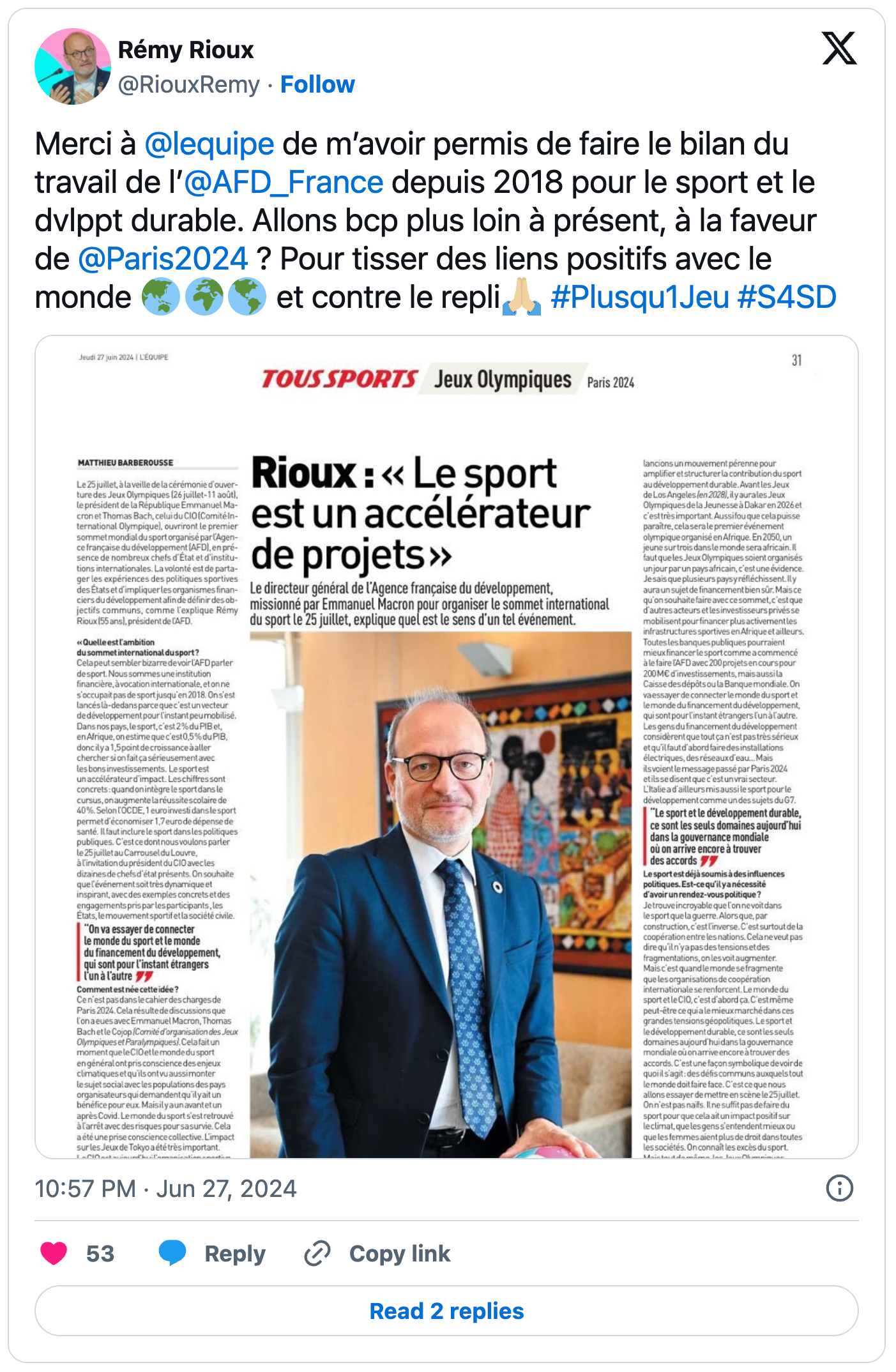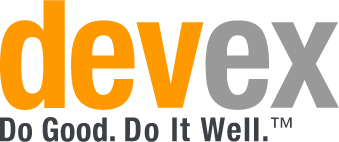|
A quick peek at the week ahead for Pro members.
|
|
|
|
Pro Weekender Brief
June 30, 2024
All eyes are on two elections that could have big knock-on effects for aid this week. The French are voting as we speak in one of their most significant elections for decades, amid a far-right surge in the polls. Incumbent President Emmanuel Macron has generally been seen as a friend to aid; French aid spending has risen considerably on his watch. But there have been recent cuts, which some observers have attributed,
at least in part, to his need to placate anti-aid voters on the right. Unless there’s a landslide, today’s vote will be the first of two rounds — the second happening this time next week — but by tomorrow we’ll have a sense of where things are headed.
Meanwhile on Thursday, Brits are heading to the polls in an election that’s expected to take them toward the center-left, with a victory for the Labour Party predicted. That’s generally considered good news for aid since the Conservatives have caused some chaos in the sector in recent years — although Labour has no immediate plans to reverse those decisions, so the main benefit in the short term might merely be a sense of stability and a fresh start. Keep reading for another big EIB update, and all your insider news and tidbits. Coming up: Please join us for our career event tomorrow, which will offer expert advice on how to land consulting roles with the U.N. Also in today’s edition: A corruption investigation at EIB, two global development organizations crowned as best places to work, and DAI’s new president. Jessica Abrahams Editor, Devex Pro |
|
Bits and pieces
A roundup of the week’s best globaldev tips, quotes, and tidbits
Good sport. While the French are voting today in an election that might not bode well for their development agency,
AFD, it’s nonetheless busy making the most of the Olympic Games that the country is hosting in a month. AFD is seeking to tie the event to the Sustainable Development Goals and will be hosting a sports summit the day before the games begin, featuring French President Emmanuel Macron and other heads of state.
“The aim is to share the experience of countries’ sports policies and to involve development finance institutions so as to define common objectives,” AFD boss Rémy Rioux told French sports newspaper L’Équipe, as he posed for a photograph with an SDG-branded soccer ball. “Sport is an impact accelerator,” Rioux said, citing the positive impact that sport in school can have on academic success rates, economic growth, and health outcomes. There’s at least one other sport-for-the-SDGs event happening in Paris before the Olympics, organized by UNESCO.  Via X.
Via X.
All the news at EIB. The blockbuster news last week was that former European Investment Bank chief Werner Hoyer is being investigated by the European public prosecutor for “corruption and abuse of influence.” Hoyer, who led the multilateral development bank for a decade until 2023, said the matter relates to a compensation payment to an EIB employee that he signed off while president, following “a recommendation from the department in charge and the Secretary General of the EIB.” He added that he is fully cooperating with the investigation and dismissed the claims against him as “downright absurd and unfounded.” In the meantime, the episode is certainly spicing up the world of development finance. In other big EIB news, the bank finally appointed a permanent director-general for its external lending arm, EIB Global, two and a half years after it launched. Andrew McDowell is coming from the private sector — he’s currently a partner at PwC’s strategic advisory service but was previously an EIB vice president. Not so fast. Médecins Sans Frontières is shutting down its Access Campaign, the nearly 25-year-old initiative that has been at the forefront of global efforts to expand access to crucial medicines. Earlier this month, the Access Campaign’s 35 employees received notice that the unit would close by the end of the year and that they would be made redundant. MSF wants to replace it with an Access to Products for Healthcare unit, which is intended to broaden MSF’s access work and bring it closer, geographically, to MSF’s humanitarian operations, with staff expected to be based in five regional hubs. But as my colleague Jenny Lei Ravelo reports, the global health community is pushing back, with more than 100 organizations signing a public letter asking MSF to reconsider the decision. MSF staff members have also written to management decrying a “lack of clear and justified rationale” for dismantling the unit, which they describe as a “goldmine of people experienced in medical advocacy, human rights, and aspects of law that are essential to access to health products issues.” Talk about last minute. CGIAR, the food security research partnership, postponed its Science Week conference at such short notice last week that some people had already landed in Nairobi and were picking up their badges when the news broke — although the main event was not due to start until tomorrow. The organization initially did not provide a reason for the postponement, simply citing “unforeseen circumstances.” However, a spokesperson told my colleague Tania Karas — who was due to attend the event — that they had received “a number of late cancellations from speakers and delegates whose organizations were advising against travel” due to the protests that have erupted in Nairobi over planned tax hikes. “This would have made the event, which involved a number of venues and field visits, challenging to deliver.” A new date will be announced as soon as possible. Looking for a job? You might want to consider applying here: Two global development organizations have made it into the Washington Post’s top workplaces list for 2024. USAID contractor Chemonics was highlighted because “employees speak about their pride in making a difference in the world,” while nonprofit ACDI/VOCA was noted for its attention to diversity in hiring. In total, 250 workplaces in Washington, D.C. made the list based on employee feedback. |
|
|
|
Moving on
An update on our industry's job moves
Julie Koenen was sworn in as USAID
mission director for Ukraine.
Tine Knott, previously executive vice president for strategy and global operations at DAI, has been promoted to president. Kate Stratten has been promoted to CEO of IntraHealth International, replacing Maqsoda Maqsodi, who is taking over the helm at Winrock International. Maya Ziswiler, previously CEO of UBS Optimus Foundation, will be the new CEO of the Roger Federer Foundation, which works on child poverty and education globally. Arjen Joosse is stepping down as chair of the Dutch Relief Alliance, and with it from his roles at World Vision Netherlands and CARE Netherlands. He’ll be taking a bit of time off and will then be open to new opportunities. Pauline Chetcuti, head of humanitarian campaigns and advocacy at Oxfam International, has been elected president of European humanitarian network VOICE EU. Jess Camburn is stepping down as CEO of Elrha, a humanitarian research and innovation organization, after 15 years. Light for the World, which works on disability rights in Africa, has named Lucy Nyaga as international director of programs and Katri Bertram as international director of impact and advocacy. Stephanie Urchick, of the Rotary Club of McMurray, Pennsylvania, is taking up a one-year term as president of Rotary International. |
|
Did we miss one? Is there a change on the horizon? Let us know at
[email protected].
|
|
In memoriam
Lars Olof Kallings, founding president of the
International AIDS Society, died on June 17. A pioneer in the fight against HIV, the Swede was among a group of experts who established IAS in the 1980s as a way of helping scientists share the latest research with policymakers. Among other roles during his long career, he served as Nordic representative to the WHO Executive Board, U.N. special envoy for AIDS in Eastern Europe and Central Asia, and director-general of the Swedish National Institute for Infectious Disease Control.
“We have lost a giant in the HIV response. … We will miss his wisdom, but his legacy will continue to guide us,” said IAS President Sharon Lewin. |
|
|
|
Job of the week
Role: Head of communications and advocacy
Organization: Education Outcomes Fund Location: Remote Qualifications: Ten years of relevant professional experience; experience leading international advocacy campaigns; history of directly managing people; experience working in a startup/ scale-up environment; fluency in English, with an additional language preferred. This executive search is supported by Devex Talent Solutions. Apply now, or find more executive-level openings. |
|
Up next
What to look out for
HLPF briefing. With the U.N. High-level Political Forum on Sustainable Development ready to kick off next week, join the International Institute for Sustainable Development for
a briefing on what to expect.
July 2.
Bretton Woods. The Atlantic Council is marking the 80th anniversary of the Bretton Woods Conference, which created the World Bank and IMF. With speakers from both institutions, as well as the U.S. Treasury, the event will take a look back at the international financial architecture that Bretton Woods created, how the institutions have evolved in the decades since, and where they must go next. It comes at a pivotal moment for these institutions as global south countries and global development advocates push for reforms that will better meet their needs. July 1. Oceans. The Fifth Global Dialogue on Sustainable Ocean Development in beautiful Bali this week will consider how to work across disciplines to move toward a sustainable blue economy. There’ll be technical training, expert presentations and panel debates on ocean planning, “ocean accounting” — in other words, the creation of integrated records of the state of environmental, economic, and social issues related to the ocean — ocean-based climate action, and sustainable finance. July 1-5. |
|
|
|
|
|
©Devex is the media platform for the global development community.
|
|
This email was sent to . You received this email as part of your Devex Pro membership. To stop receiving this newsletter, unsubscribe, or manage your newsletter preferences. |
